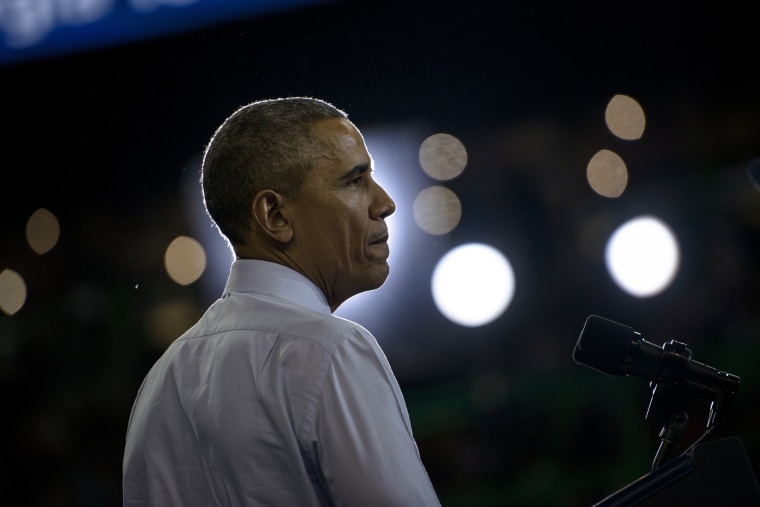Michael Eric Dyson and Eddie Glaude Jr., two well-respected black intellectuals and professors, make the same argument in books they have released over the last month: President Obama hasn’t done enough on policy to help fellow African-Americans and regularly uses rhetoric that is overly critical of blacks.
“Obama energetically peppers his words to blacks with talk of responsibility in one public scolding after another,” Dyson writes in The Black Presidency. “When Obama upbraids black folk while barely mentioning the flaws of white Americans, he leaves the impression that race is the concern solely of black people, and that blackness is full of pathology.”
“Obama’s reprimands of black folk also undercuts their moral standing,” he adds.
Glaude, in Democracy in Black, argues that under Obama, “black communities have been devastated.”
“And Obama’s most publicized initiative in the face of all of this, even as the spate of racial incidents pressured him to be more forthright about this issue, has been My Brother’s Keeper, a public-private partnership to address the crisis of young men and boys of color—A Band-Aid for a gunshot wound,” writes Glaude.
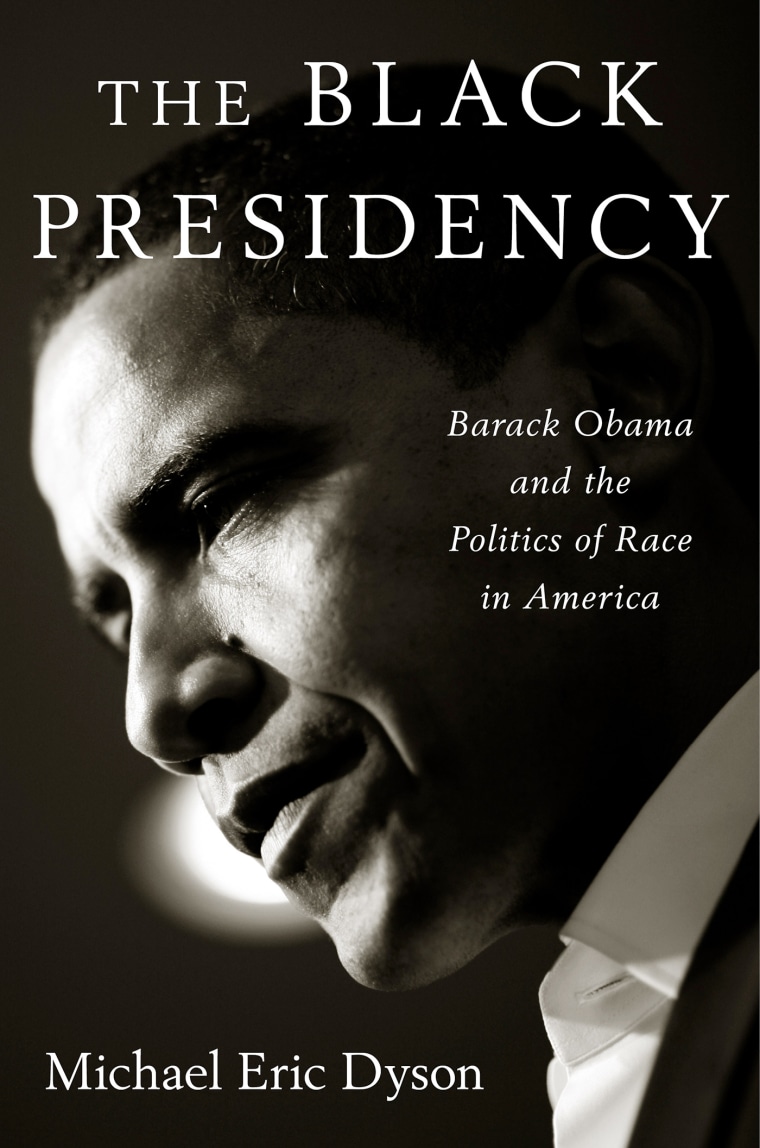
These books, released as Obama’s tenure nears its end, are the most comprehensive versions of a case against the president’s leadership style that a number of prominent black intellectuals have made.
In his 2012 book The Price of the Ticket, Columbia professor Fredrick Harris argued persuasively that Obama felt less compelled to act on behalf of black Americans in part because African-American leaders were unwilling to apply pressure to the first black president. In contrast, other liberal-leaning constituencies, particularly gay rights activists, treated Obama like any other president, aggressively pressing him to adopt their policy goals.
Ta-Nehisi Coates, the award-winning author and writer for The Atlantic, wrote in 2013 that Obama was the “scold of Black America.”
What Glaude, who teaches at Princeton, adds to this debate is a broader context for viewing race in the Obama presidency. Glaude’s book helps explain the phenomenon of the last two years, in which a movement called Black Lives Matter has gained strength while a black man lives in the White House.
Glaude argues that Obama emerged and entered the Oval Office at a time of decline for institutions that had once been vital to black political and culture life: historically black colleges, well-established black churches and black-owned newspapers. In a previous era, writes Glaude, the leaders of those institutions would have provided an alternative voice on racial issues during the Obama years, including criticizing the president himself and holding him accountable to the broader black community.
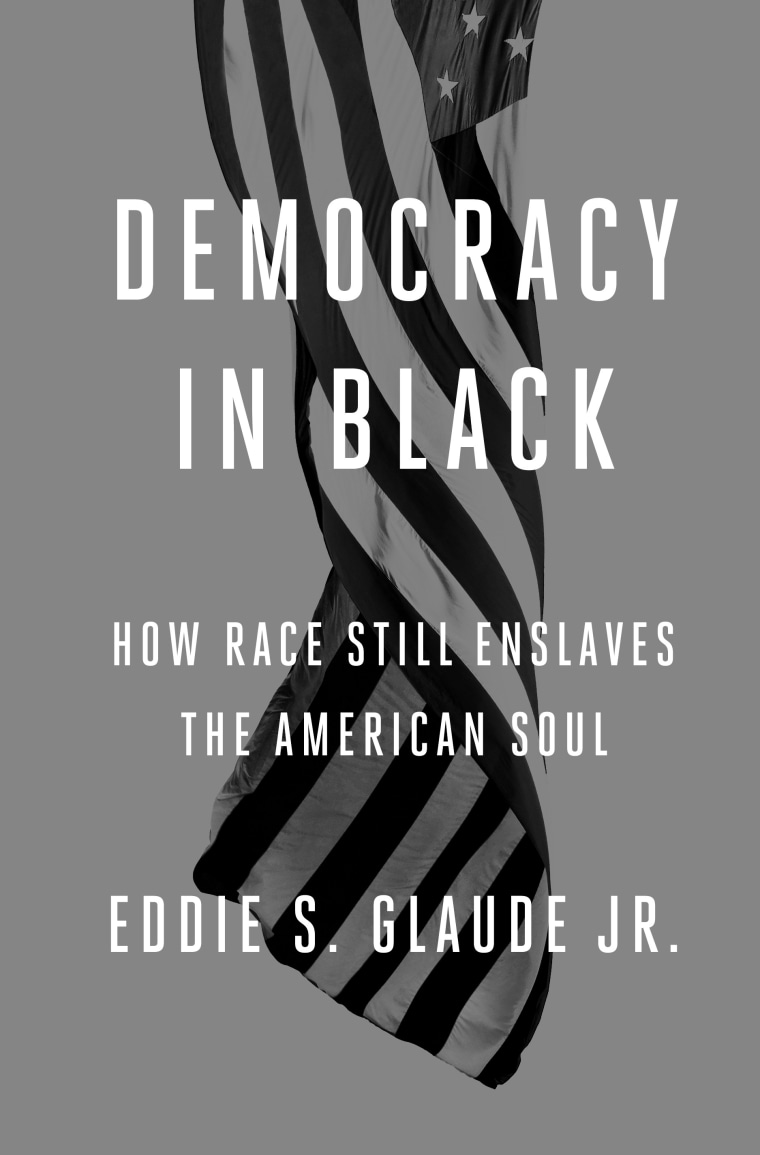
In part because of those weakened institutions, Glaude concludes that the strategies of a previous generation of black leaders are now outdated. Black leaders from Martin Luther King Jr., to Jesse Jackson to Obama, Glaude argues, have used a model that assumes that America has the right values, and blacks and other disadvantaged groups should simply press for the country to live up to its ideals.
That model worked for breaking barriers to blacks voting and more recently in getting people who are gay the right to marry. But Glaude believes the racial problems of today require a total overhaul of how black Americans try to influence American society.
Glaude’s book concludes with the professor taking a trip to Ferguson, Missouri, where he meets with Black Lives Matter activists. The activists openly criticize veteran civil right leaders like Jackson and The Rev. Al Sharpton for using bland, old-style tactics, and Glaude embraces their view.
The right question is how did Obama govern compared to who else might have been president, and what were his decisions in the context of what realistically could have been adopted by Congress and supported by the public?
“We often find ourselves reaching for political language and strategies developed under one set of conditions (primarily that of the civil rights and Black Power movements of the 1960’s and 1970’s) to speak to circumstances that result from another set of conditions transformed by economic and political forces,” Glaude writes.
Dyson is more narrowly focused on Obama, with one chapter alone dissecting the moving speech the president gave last year in Charleston, South Carolina, after the murder of nine African-Americans in a church there. Both President Obama and former Attorney General Eric Holder spoke to the professor for his book, and addressed racial issues in more blunt terms than either man usually does in public.
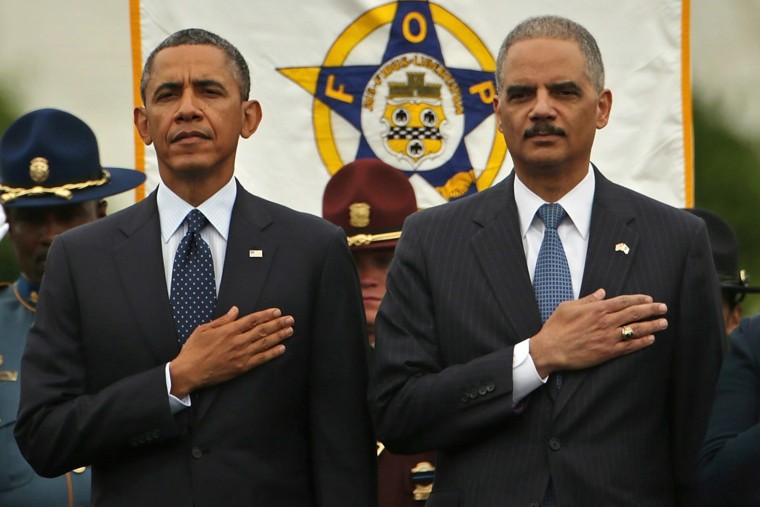
“I’m not his ‘Inner Nigger,” Holder told Dyson, refuting the idea that his blunt rhetoric on racial issues while serving in the Obama administration was Holder articulating thoughts the president had as well but was too scared to express because of the potential political fallout. (Cultural critic Richard Benjamin had originated that term.)
Holder added, “If he were attorney general of the United States, he would be an attorney general in my mold. And if I were president--and that’s a frightening thought--I’d probably be a president like him.”
Both books were released during Black History Month, and while that timing may have been coincidental, it fits with the narratives of Dyson and Glaude. Both men in effect write compelling histories of the post-King era of black American life, showing the reader how much of black politics is not about Barack Obama.
The books suffer from two similar flaws. First, both over-personalize the presidency, and suggest Obama’s role in leading the country is singular. Names like Geithner, Axelrod, Emanuel, Gibbs, Plouffe, Pfeiffer, Summers, Pelosi, Baucus, and Reid are virtually unmentioned in these accounts.
Glaude and Dyson are academics, not journalists, and neither man is trying to tell a Bob Woodward-style narrative of the Obama administration. That said, they are oversimplifying Obama’s actions on racial issues by not highlighting the roles of those who influenced, shaped and in some ways set those policies.
Obama and his advisers had run a very successful campaign to elect the first black person to the White House by largely never talking about race.
Obama didn’t get to the presidency by himself. In late 2006, a number of prominent figures in the Democratic Party, worried Hillary Clinton couldn’t win the general election, urged him to run. Obama’s race helped in some ways, because party officials who were anti-Clinton would not be accused of trying to replace her with a traditional white male candidate.
But Obama was embraced by the overwhelmingly-white Democratic establishment because he was already a part of it. The institutions on his resume before the White House included Columbia, Harvard, the University of Chicago and the U.S. Senate.
Obama ran for president aided by a team of veteran political advisers, the plurality of whom were white, and wealthy donors, many of whom worked on Wall Street and in the financial industry.
Obama didn’t promise to reform health care as president simply because he liked the idea. It was essentially a requirement of the Democratic primary in 2008 -- if you wanted endorsements from labor unions -- to write up a detailed health care proposal and declare it one of your top goals. Liberal-leaning African-American groups didn’t have the sway to make such big demands, and therefore didn’t get major commitments from the candidates.
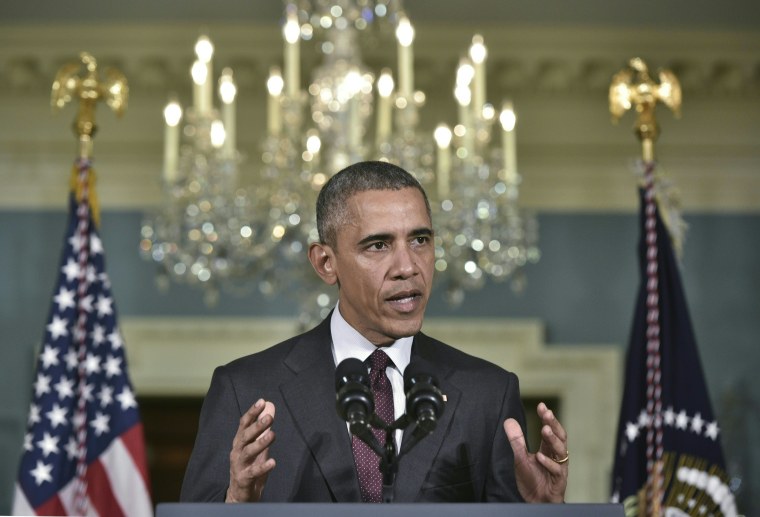
Obama entered the White House having pledged to implement a very similar list of goals to what Hillary Clinton would have. Many of his top advisers would have served in a Hillary Clinton administration.
As a result, the early stages of his presidency were like a third term of Bill Clinton.
Dyson criticizes Obama for publicly rebuking Holder in 2009, after the attorney general said the U.S. was a “nation of cowards,” scared to openly discuss racial issues. This comment, while accurate, was considered impolitic at the time, and not just by the president. It was covered by the press as a gaffe and not defended by other Democrats.
Obama and his advisers had run a very successful campaign to elect the first black person to the White House by largely never talking about race. It’s not surprising they took the same approach once in office and believed that would be the most effective strategy.
Later in his first year, Obama made the fairly benign comment that Cambridge, Massachusetts police “acted stupidly,” in arresting Harvard professor Henry Louis Gates, Jr. in front of his house. Obama quickly found himself under fire and forced to backtrack.
What both the Gates and Holder moments illustrated was the state of the media and the public on racial issues in 2009 and 2010. Openly highlighting racism was challenging back then, and few national politicians outside of the Congressional Black Caucus were regularly discussing racial issues of any kind.
Dyson praises Obama’s speeches from 2015, when the president spoke much more boldly on issues like mass incarceration and police brutality. What changed? One potential reason is that Obama, getting closer to the end of his tenure, felt freer to speak his mind.
But the more important change was what was happening around the president. Footage of police killings of blacks and related protests were on the news constantly. Not only had “Black Lives Matter” emerged, but even white politicians were invoking the phrase. Polls showed white Americans, particularly those who are left-leaning, were more concerned about police conduct toward minorities than before.
Obama, as Coates wrote in 2012, “is not simply America’s first black president—he is the first president who could credibly teach a black-studies class.” Obama’s two books, published before he was elected president, included very sophisticated ideas about racial identity. What changed from 2009 to 2015 was likely not Obama’s feelings about racial issues, but the context in which he was president.
Politicians are often urged to show leadership, but in reality, most effective politicians do a lot of following, figuring out where public opinion is headed and trying to get just in front of it. Obama has followed this pattern.
In this sense, the authors are right to criticize him for not leading on racial issues, but perhaps idealistic in suggesting a true leader, particularly calling on America to fix its racial problems, could have ever gotten to the Oval Office.
If Obama, in 2009, had proposed a national commission to examine policing throughout America, this would have sounded like a very controversial idea. Six years later, Obama’s “Task Force on 21st Century Policing” released a long list of proposals, and the main criticism, even from some whites, was that the proposals were not far-reaching enough.
Dyson, in a recent New Republic essay, argued that Hillary Clinton, if elected in 2016, can be a bolder leader on racial issues than Obama, in part because she won’t have the challenges with being a black president.
The bigger shift will be that Clinton would enter office in 2017, after years of intense protests around racial issues, while Obama started in 2009, with many whites feeling his election had effectively ended the racial divide.
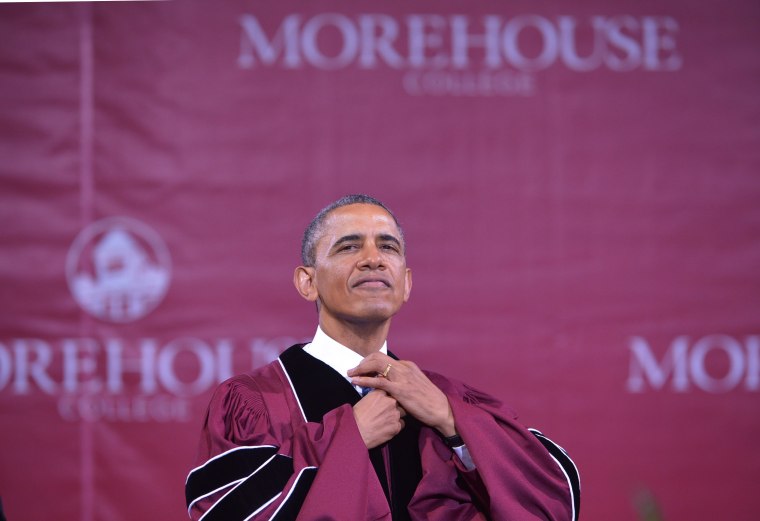
The authors are right to criticize Obama’s speeches to African-Americans, which including regular chidings on issues from calling on black men to be better fathers to telling black parents to make sure their kids did homework. He rarely spoke this way to white audiences.
Obama’s speeches to black audiences from 2007-2013 feel particularly off-key after the events of the last two years, in which some of the challenges of being black in America have been starkly illustrated.
The black president visiting Morehouse College, the historic school Martin Luther King Jr. attended, and telling the graduates, “Nobody cares how tough your upbringing was,” and “There’s no longer any room for excuses” was unwarranted and in many ways inaccurate. (The legacy of racial discrimination in America and its effects are real and not an excuse.)
And that speech was given in 2013, after Obama had won reelection and had no need to speak to blacks in certain ways to ensure the support of whites.
The second flaw of the books is how the two authors discuss policy in the Obama administration. Both use similar data to cast Obama as a failure for black Americans. Since the president entered office, black wealth has declined dramatically, while the unemployment rate among blacks shot up to more than 16 percent in 2010, although it is back to around 8 percent now.
Blacks not only are more likely to be poor than white Americans, but black poverty is in many ways worse than white poverty, because poor blacks are more likely to live in very high-poverty areas.
The authors do acknowledge the massive recession that started right before Obama entered. But they still grade the president on absolute terms.
The more appropriate criterion to evaluate Obama is not whether black unemployment drastically decreased under his leadership. The black jobless rate has been double that of whites for decades, and much of the wealth in the black community was tied up in the housing market, which sharply declined amid the recession.
The right question is how did Obama govern compared to who else might have been president, and what were his decisions in the context of what realistically could have been adopted by Congress and supported by the public?
The Obama administration has one huge policy failure that disproportionately affected blacks: housing. Obama and his advisers, particularly Treasury Secretary Timothy Geithner, repeatedly ignored warnings that their policies in 2009 and 2010 were not aggressive enough to help homeowners who couldn’t afford to pay their mortgages. Black and Latino families were more likely than whites to have their homes foreclosed. Majority-black areas, like Prince George’s County, a suburb just outside of Washington, D.C. saw huge declines in home values, robbing families of much of their wealth.
And on this issue, Obama and his team have very few excuses. Democrats controlled Congress. There was a great public awareness of the housing crisis. Obama and Geithner, who led the administration’s response to the financial crisis, simply not did come up with effective solutions.
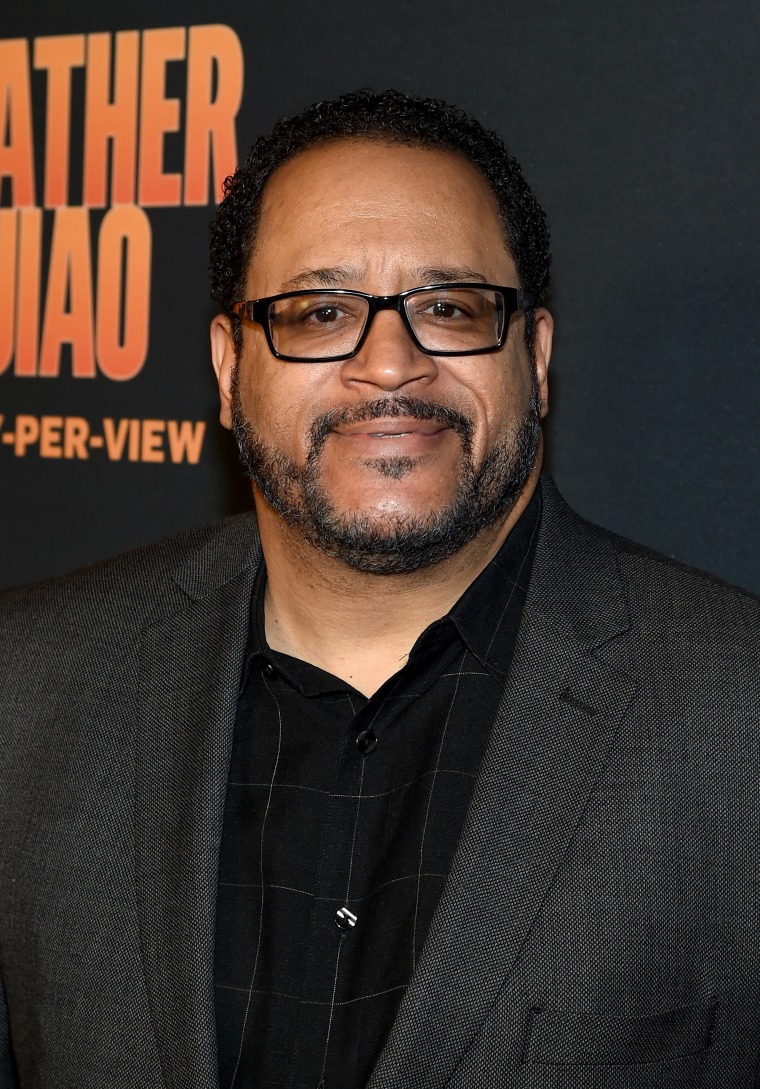
But the administration has done far more than My Brother’s Keeper on racial issues: filing lawsuits to block controversial, GOP-backed voting laws, reducing the disparity in prison sentences between crack and powder cocaine users, defending affirmation action, demanding police departments like the one in Ferguson change their practices, trying to limit the number of young minority students who are suspended from school, and taking steps to shut down for-profit colleges that often prey on minority students.
Some African-Americans are gay, and they can serve openly in the military and get married in every state in part because of pushes from the administration. Millions were jobless or did not have health insurance and gained those in part through the 2009 stimulus bill and 2010 Affordable Care Act.
“Who gets Pell Grants?” Obama rhetorically asked Dyson. (About a quarter of Pell Grant recipients are black, and Obama signed into law an increase in the program’s funding.)
To be sure, there were huge disparities between blacks and whites before Obama entered office. And they will remain afterward.
“My suspicion is that, more anything, my election will have affected changes that have already taken place in society; different attitudes about race among a younger generation, great comfort with positions of authority,” Obama told Dyson. (The author confirmed to NBC that the president used the term “affected,” not “reflected.”)
Obama added, “I’d like to think that my election over time will help consolidate and further fuel great acceptance of people’s differences.”
That comment encapsulated Obama’s perspective on racial issues. It cast him less the primary leader in America’s racial debates, and instead an influential, but not all-powerful participant.
Glaude and Dyson correctly say the president often didn’t lead on racial issues. Right or wrong, it sounds like he wasn’t trying to.
